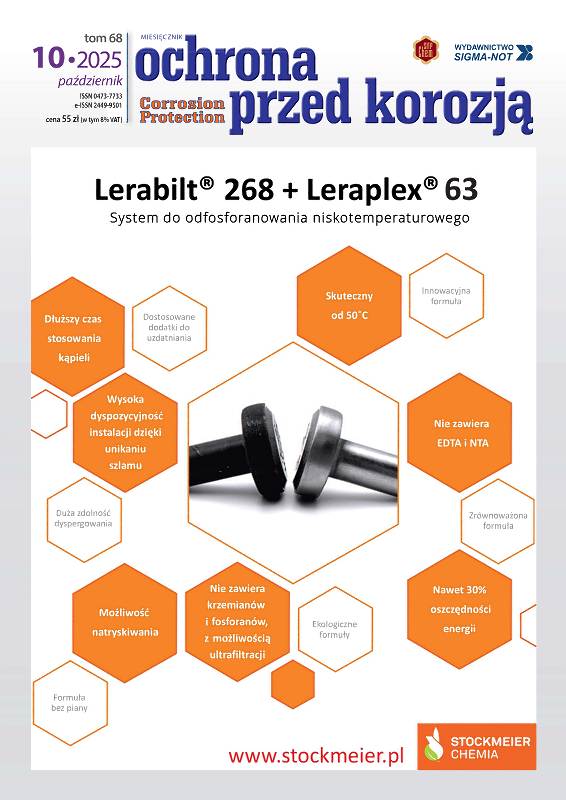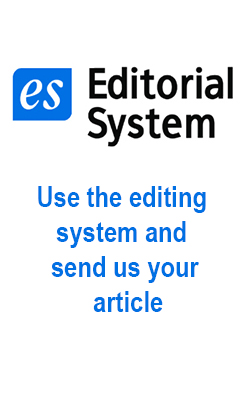
Please submit articles using the Editorial System available above.
The Editor accepts original scientific articles, preliminary reports, review articles and case studies for publication.
English is the main publishing language.
The translation of the articles into English is financed by funds granted by the Ministry of Education and Science under the “Development of Scientific Journals” program, project RCN/SN/0650/2021/12.
Project implementation time: 2023-2024.
The score of the journal “Corrosion Protection” in the Ministry of Science and Higher Education is 40 points. (Announcement of the Minister of Science, 5.01.2024).
Since November 2017, the journal in Web of Science, in the Emerging Sources Citation Index, maintained by Clarivate Analytics (formerly Thomson Reuters) – Journal Impact Factor for 2023: 0.2.
As of 2019, journal indexed in SCOPUS database. Cite Score 2023:0.2. SJR 2023: 0.131. SNIP 2023: 0.142.
ICV (Index Copernicus Value) 2023: 116,21.
Journal present in the DATABASE:
- Web of Science – Emerging Sources Citation IndexSCOPUS
- SCOPUS
- BAZTECH
- EBSCO
- Index Copernicus
- Pol Index
- ABCD Index
“Ochrona przed Korozją” is published in cooperation with the Polish Corrosion Society and the European Federation of Corrosion.
Our monthly issues original papers from all fields of corrosion and corrosion protection. We accept topics concerning: corrosion phenomena, test methods, corrosion protection technologies – paints, electrochemical protection, conversion layers, metallic coatings, corrosion inhibitors, plastics, electroplating, corrosion of metals, concrete, wood, microbiological corrosion, corrosion engineering. We do not accept articles outside our Aims & Scope.
Articles are reviewed by specialists in the field covered by the article (single blind review). It takes about 7 days to receive the first response, 30 days to receive the review, and about 120 days to publish the article after final approval.
After publication, we send the authors a free copy of the journal.
Scientific articles are published for a fee.
The cost of printing is (net prices):
- 1 page of print (Polish) 350 zł
- 1 page of print (English) 400 zł
- 1 page of print (bilingual: Polish and English) 300 zł
- 1 page of print (for works from abroad) 150 EUR or 150 USD
The editorial board accepts for publication only original papers, not previously published in other journals or materials of conferences (congresses, symposia), unless the publication is ordered by the editorial board. An article submitted to the editor must not have been previously published in whole or in part in another journal or simultaneously submitted for publication therein. The fact of submitting a paper to the editor is considered tantamount to a statement by the Author that this condition is fulfilled. A prerequisite for the publication of an article is sending to the editorial office a signed License Agreement ( License Agreement , Licensing Agreement).
Authors of materials submitted for publication in the journal are responsible for compliance with copyright law – both the content of the work and the illustrations or lists used in it should be the author’s own work or must be described in accordance with the rules of citation, citing the source of the quotation. Upon receipt of the article by the editorial office, the copyright is transferred to the Publisher, who henceforth has the right to use the work, dispose of it and reproduce it by any technique, including electronic, and distribute it through any distribution channels. The Editor does not return unsolicited materials and reserves the right to edit and shorten texts and to make summaries. The editors are not responsible for the content of advertising materials.
We also print conference information, announcements, notes for the “News – Information” and “Materials – Devices – Technologies” sections, reviews of books, conference materials, etc. We pay honoraria only for materials ordered by the editorial board.
We encourage you to read the EASE (European Association of Science Editors) guidelines for authors and translators of scientific articles published in English.
Principles of ethics concerning author’s materials published in SIGMA-NOT Publishing House journals (developed on the basis of COPE – Committee on Publication Ethics guidelines)
SIGMA-NOT Publishing House, as a publisher of professional journals, is committed to taking measures to uphold ethics in author’s materials, publish high-quality articles and prevent unethical phenomena in science. Adherence to ethics is expected equally from all participants in the publication process: authors, editors, reviewers and the publisher.
Editor’s responsibilities
The Editor evaluates papers in a fair and objective manner, with no regard to the author’s race, gender, sexual orientation, religious belief, political philosophy, ethnic or geographic origin. The Editor’s decision is made only on the basis of the article being analysed, taking into consideration its originality, scientific value, clarity, importance of the research or information for the science and technology community in a given domain. The Editor treats all papers received form the Authors as confidential and does not disclose them to persons that are not directly participating in the publication process (authors, editors, reviewers etc.) and does not use them for their own research purposes without the Author’s written consent. The Editor enables the Author to publish a factual discussion concerning a part of an article being reviewed. The Editor does not block the possibility of publishing negative research results. The Editor and the Editorial Board pay special attention to the applicable legal requirements concerning copyrights.
Responsibilities of the Reviewer
The object of peer review is to assist the Editor-in-Chief and the Editorial Board in making decisions concerning the article’s publication and to possibly help the Author in correcting or improving their work. The Reviewer should objectively evaluate if they are able to review a given article, taking into consideration the paper’s substance and a deadline determined by the Editorial Board. The Reviewer declines reviewing a given article if they identify a conflict of interests resulting from e. g. financial, personal or professional connections with article’s author(s), company or an institution associated with the paper. The Reviewer treats all papers received form the Editorial Board as confidential and does not disclose them to third parties or use them for their own research purposes without the Author’s written consent. The Review should be formulated objectively, clearly, unambiguously, without personal criticism. Critical notes should be supported by matter-of-fact statements. The Reviewer should notify the Editor of any similarity of an article being reviewed to any other papers that they know.
Author’s responsibilities
The Author submits exclusively the original and unpublished papers, stating that they have the rights to dispose these materials. Submitting a paper simultaneously to several publishing houses in unacceptable. An article should be prepared with appropriate citing and present methods, research and results clearly so that the Author’s reasoning can be followed and possible repeating of the research can be done by other researchers in a given domain. The Article should take into account the state of knowledge in a given domain, and the research results should be described and analysed extensively and objectively. If partial results have been previously published, the Author should inform the Editor and state it in the article. The Author declares that the research data used in the publication have not been fabricated or manipulated. The article’s authorship is limited to the persons who made significant contributions to the idea, objectives, methods, research execution and interpretation of results as well as the substantial development of the article. All persons who made substantial contributions to the article must be listed as co-authors. The Author submitting the paper should disclose contributions of each and every author and make sure that all co-authors accept the article’s submission to the journal and the final version of the article. The Author should inform the Editorial Board about significant errors found in the paper and cooperate with the Editor to correct them before publication or to make a correction in form of an errata. The Author should store raw data to make it accessible to the Editorial Board or the authorized institutions if inquired. The Author confirms, in justified cases, that all research were conducted in accordance with ethical and formal regulations applicable in a given domain of science (e.g. bioethics commission’s consent). The Author should disclose information concerning financing the publication, contributions made by scientific research institutions, associations and other parties, as well as the possible conflicts of interest connected to the article.
Procedures in case of unethical practices
In case of alleged misconduct in the published or submitted artcile, especially in case of plagiarisms such as ghostwriting or guest authorship, the Editor takes measures to clarify the situation; the first step is to ask the Author to comment it. In case of confirmed misconduct significantly breaching the ethics, the Editor takes further action, for example: publishing an information about the discovered misconduct and informing entities in which the Author is affiliated. Any signs of scientific misconduct are documented by the Editorial Board.
The editors implement procedures for dealing with dishonesty and plagiarism. Here you can review the Comittee on Publication Ethics (COPE) diagrams, which outline the algorithm for dealing with situations where dishonesty is detected.





